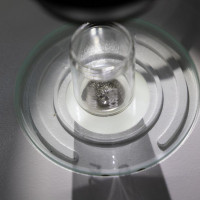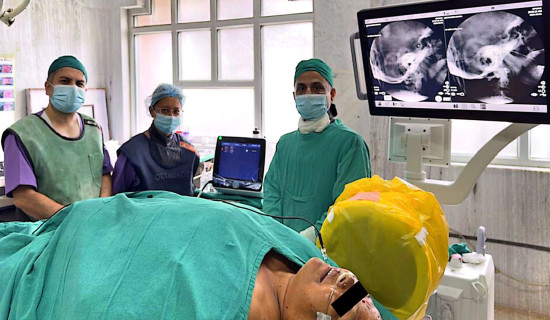- Thursday, 28 August 2025
Neuralink: Bridging Gap Between Mind And Machine
Neuralink, spearheaded by tech specialist Elon Musk, stands at the forefront of groundbreaking innovation, promising to bridge the gap between humanity and artificial intelligence. Founded on the ambitious vision of enhancing human cognition and combating neurological disorders, the company is pioneering the development of brain-computer interfaces (BCIs) and neural implants. These innovative technologies aim to establish smooth communication pathways between the human brain and external devices, unlocking new possibilities for human-machine interaction. With Musk's ambitious drive and a team of brilliant minds, it represents a bold leap towards a future where the boundaries between humans and machines blur, reshaping the landscape of neuroscience and technology. Neuralink's mission is to revolutionise human potential and understanding of the brain. It aims to address neurological disorders, such as alzheimer's, parkinson's, and paralysis, by restoring lost functionality and improving overall quality of life.
Additionally, the company seeks to augment human cognitive abilities, unlocking new heights of creativity, learning, and communication. By integrating human brains with artificial intelligence, it envisions a future where individuals can effortlessly interact with technology using their thoughts, leading to deep advancements in healthcare, education, and beyond.
At the core of Neuralink's revolutionary technology lies the brain-computer interface (BCI), a sophisticated design to establish communication between the human brain and external devices. This technology is achieved through ultra-thin, flexible neural implants composed of tiny electrodes capable of recording and stimulating neural activity with remarkable precision.
These implants are surgically inserted into the brain, forming a neural connection that interfaces directly with neurons. Through this interface, the brain chip enables bidirectional communication, allowing individuals to control computers, prosthetics, and other devices while providing real-time feedback to the brain. This technology can transform healthcare, neuroscience, and human-computer interaction. Animal Experiments and Human Trials: The company previously conducted pig trials and highlighted a monkey playing Pong via the brain implant. In May 2023, human testing commenced, with the first patient receiving the brain chip.
Neuralink Implants the First Brain Chip in Humans: Elon's neurotechnology company successfully implanted its first brain chip in a human patient. The FDA-approved surgery demonstrated promising results in detecting neuron spikes. The initial product, "telepathy," aims to enable device control through thought, benefiting individuals with limb loss. Beyond limb control, Neuralink could revolutionise sensory experiences. By connecting brain signals directly to visual or auditory implants, blind individuals might regain sight, and the deaf could hear again. These advancements would transform lives. Remember, these examples represent the beginning. Neuralink's ongoing experiments and innovations keep pushing the boundaries of what is possible in neuroscience and technology!
But the efforts are not without their challenges and ethical considerations. One major challenge is ensuring the safety and reliability of neural implants, as any malfunction could have grievous consequences for patients.
Moreover, the invasive nature of the surgery required for implantation raises concerns about potential health risks and long-term effects on brain function. Ethically, issues of privacy and consent threaten large, as the collection and utilisation of neural data raise questions about individual autonomy and the protection of sensitive information.
Additionally, the potential for misuse of brain-computer interfaces raises ethical dilemmas regarding control, security, and unbiased access to this transformative technology. Balancing innovation with ethical responsibility is essential as Neuralink navigates these complex issues. Although Neuralink's transformative technology opens doors to many potential applications across various domains, in the medical field, it holds promise for revolutionising the treatment of neurological disorders, offering hope to individuals with conditions such as paralysis, Alzheimer's, and Parkinson's disease by restoring lost functionality and improving quality of life. Beyond healthcare, Neuralink's brain chips could guide a new era of human-computer interaction, enabling control of electronic devices, prosthetics, and vehicles using only the power of thought. Moreover, as mentioned before, it could enhance cognitive abilities, learning experiences, and memory capacity while fostering new modes of communication and immersive experiences in gaming and virtual reality.
Neuralink's debut has triggered excitement and scepticism within the public sphere. Supporters celebrate its potential to revolutionise healthcare, enhance human capabilities, and create a new boundary in human-computer interaction. However, critics voice concerns over privacy violations, ethical implications, and the potential for deepening societal inequalities. Some argue that the focus on merging human brains with artificial intelligence may confuse the lines between individuality and autonomy, raising ethical dilemmas about the fundamental nature of human identity and control. Moreover, questions linger about the long-term effects of invasive brain implantation and the impartial distribution of this "alien" technology. Looking ahead, the future outlook for Neuralink brims with promise and uncertainty. As the technology matures, the company aims to refine its neural interfaces, making them safer, more reliable, and less invasive. With continued research and development, the potential applications of Neuralink's technology would expand exponentially, surpassing healthcare to encompass diverse fields such as education, entertainment, and beyond. However, significant challenges remain, including regulatory hurdles, ethical dilemmas, and the need for widespread acceptance. The trajectory of Neuralink centres on navigating these obstacles while harnessing the power of brain-computer chips to shape a more connected, intelligent, and better future.
In conclusion, Neuralink emerges as a new hope for boundless possibility and responsibility. With Elon Musk guiding its trajectory, they move boldly into uncharted territory, balanced to reshape the very fabric of human experience. Its promise to relieve suffering, enhance cognition, and transcend the limits of human potential captivates our imagination. Yet, among the awe-inspiring views of progress lie doubt and ethical difficulties.
(The author is a software engineer with AI.)

















